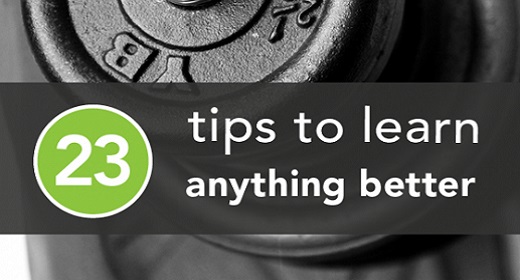by Nick English: Learning hacks — they’re a thing, and while the college kids are heading back to school…
it’s a good time for all of us to rethink the ways we learn. Student, professional, or parent, we’re all learning every day — whether it’s how to play guitar, use new software, raise a child, or poach an egg, the mind is always soaking up new information. Make it easier with the following tips.
Prime Your Mind — Creating Habits that Optimize Learning
With a little regular maintenance, the mind can become razor-sharp and ready to tackle any challenge and absorb new information. Keep the brain in tip-top shape by making regular habits out of the following activities.

1. Work Out
Lifting weights and doing cardio carry a host of physical benefits (see: almost everything on this site), but turns out exercise can also improve learning and memorySpatial+memory+is+improved+by+aerobic+and+resistance+exercise+through+divergent+molecular+mechanisms.+Cassilhas,+R.C.,+Lee,+K.S.+et+al.+Psychobiology+and+Exercise+Research+Center,+CEPE,+Sao+Paulo,+Brazil.+Neuroscience,+2012+Jan+27;+202:309-17.. If your thoughts are muddled, try taking a brisk walk or heading to the gym. One study found that memory and cognitive processing (the ability to think clearly) improved after a single 15-minute exercise sessionExercise+holds+immediate+benefits+for+affect+and+cognition+in+younger+and+older+adults.+Hogan,+C.L.,+Mata,+J.+et+al.+Department+of+Psychology,+Stanford+University,+Stanford,+CA,+USA.+Psychology+and+Aging,+2013+Jun;+28(2):587-94..
2. Meditate
Regularly getting your om on isn’t just great for managing stress, it also improves memory, impulse control, and attention spanTrusted SourceTrusted SourceTrusted Source
3. Eat Polyunsaturated Fatty Acids
PUFAs (particularly omega-3 fatty acids) are crucial for brain function and help control the brain’s learning and memory centersPolyunsaturated+fatty+acids+as+putative+cognitive+enhancers.+Yehuda,+S.+Department+of+Psychology,+Bar+Ilan+University,+Ramat+Gan,+Israel.+Medical+Hypotheses,+2012+Oct;+79(4):456-61.Collaborative+effects+of+diet+and+exercise+on+cognitive+enhancement.+Gomez-Pinilla,+F.+Department+of+Integrative+Biology+and+Physiology,+University+of+California,+Los+Angeles,+CA.+USA.+Nutrition+and+Health,+2011;+20(3-4):165-9.. Salmon is a famously terrific source of omega-3s, but other fish, such as herring and mackerel, contain a similar amount. Meat-free sources of PUFAs include walnuts, peanuts, and chia and pumpkin seeds.
4. Sleep
When the crunch is on, people often sacrifice their Zzs in favor of more time to work or study. But the extra smidge of work that gets done isn’t worth the morning zombie eyes: Getting adequate sleep every night is absolutely crucial for brain function, good judgment, reaction time, and even using consistent grammar. The mind of a sensible sleeper will learn much faster, justifying the hours “lost” by getting an early night.
5. Drink Water
This tip might be a no brainer (pun intended), but dehydration is more widespread than you might think — if you’re thirsty, it’s already too late. Reaction times, responsiveness, and overall mental processing improve with hydration, so invest in a BPA-free water bottle and take it absolutely everywhere. Also remember that a lot of common foods, particularly fruits, are surprisingly good sources of water.

6. Practice Yoga
There’s an easy way to increase your brain’s grey matter: Do yoga. Yogis also report fewer cognitive failures, i.e., errors in perception, memory, and motor functionTrusted SourceTrusted Source.
7. Take Up a Hobby
It’s important to spend some time each day on activities other than work or studying. Not only does the brain need time to take stock of all the learning it’s done, but picking up unrelated hobbies can make you smarterTrusted Source. Try something that requires a lot of concentration and hand-eye coordination: One study found people who took up juggling classes demonstrated an increase in their grey matter (though it disappeared once they quit)Trusted Source. That’s one more reason to never stop learning new things.
8. Set an Agenda
Success is often tied to the ability to implement structure in one’s life, so it’s a good idea to set goals and create realistic study schedules. By “realistic,” we don’t just mean allocating more than an hour for that 5,000 word report — it’s also important to schedule time to recover between bouts of intense work, whether it’s learning new software or how to drive stick. Scheduling in relaxation time for the brain is called “the spacing effect,” and it’s known to improve long-term recall.
9. Laugh
Allocating time to relax is important to avoid burnout, but it’s even better to do so with people who make you giggle. The simple act of laughter has been shown to help with problem solving and creativityTrusted Source. Funny, right?
10. Check Your Motivation
Ask, the question, “Why am I learning this?” People learn better if information seems useful to them, and particularly if they believe it can have an impact on their community. Choose a course, hobby, or career (gulp) that’s important to you and gets you excited.
Learning to Learn — How to Practice and Study Right
Now that you’re ready to focus on learning new skills or information, try to be mindful of the following tips.

11. Warm Up Your Brain
Have a little fun before you begin work: Try mentally “warming up” for your brain workout with rhyming games or by uttering nonsense words. It’ll help you loosen up and become more receptive to learning. Sounds like a great excuse to finally take those scatlessons.
12. Find a Friend
If keeping yourself on task is an uphill battle, trying asking someone to join you. Learning in groups (be it a class, book club, or with a buddy) could be a good idea to help maintain focus and add some accountability to the process.
13. Check Your Surroundings
The right learning environment is paramount. In general, it should be clean and quiet, but it’s also a great idea to add some novelty: Try working in a park, a café, or even just a different room in your home. Avoid lying in bed, though — while a study area should be comfortable, the bed is psychologically associated with sleep and relaxation. You’ll concentrate better elsewhere.
14. Develop Metacognition
This is the overarching theme in most literature about improving the learning process, and has been studied by teachers since Aristotle was lecturing in the 4th century, BC. The concept of metacognition emphasizes not just understanding material, but understanding how you understand it. Learn to step back from your first impression, question your own knowledge, and evaluate whether and how you’re digesting new material. Sometimes this is as simple as not reading so fast when the language is difficult, or developing a new system for taking notes. Most simply, metacognition is about being reflective about the learning process and making adjustments as needed.
15. Do One Thing At a Time
The ability to multitask might be lauded as an invaluable trait, but switching back and forth between tasks has been shown to increase the time it takes to complete themTrusted Source. Try to embody a different strength: single-mindedness.
16. Don’t Be Afraid to Fail
A group study in Singapore found that people who tried to solve difficult math problems without any instruction or help were more likely to fail — but in the process, they came up with a lot of ideas about the nature of the problems and what solutions might look like, which helped them perform better with similar problems later on. This phenomenon is called “productive failure.” While it’s akin to the frustrating process of trial and error, it keeps the mind creative and flexible.

17. Test Yourself
Don’t wait until the week of the exam or the big piano recital — self-test regularly, or (even better) have a classmate or friend ask the questions. If it’s difficult to remember the answer fairly quickly, it’s best to look it up. Otherwise, you’re really learning the “error state” of drawing a blank when asked the question. While “productive failure” (see: #16) is useful for problem solving, repeatedly failing to recall something that requires rote memorization (e.g. History or Law) won’t improve your learning abilities.
18. Always Be Compressing (ABC)
This was a cornerstone of Tim Ferriss’ bestselling guide to learning quickly, The 4 Hour Chef. Try as hard as possible to fit all of the necessary information into an easy one- or two- pager by using mnemonic devices like acronyms or rhymes. Better yet, try turning information into an image, such as a graphic, chart, or mind map. Visualizing knowledgein different ways helps to give it a stronger representation in your mind.
19. Conditionalize the Information
In other words, study up on the broader applications of whatever you’re learning (i.e., figure out why it matters). Textbooks (and bad teachers) often present facts and formulae without giving any attention to helping students learn the conditions under which they’re most useful. Working to understand when, where, and why the knowledge is important will help to solidify it in your mind.
20. Use Multiple Media
The more ways you experience information, the more likely you are to retain it. Different media activate different areas of the mind, and we recall things more quickly and retain knowledge better when multiple parts of the brain are working in concert. Try reading, listening to a podcast, watching YouTube videos, saying material out loud, and writing about it by hand (just not all at the same time)
21. Connect With Existing Knowledge
If you can tie what you’re learning to something you’ve learned before, it helps to improve recall speed and promote new learning. For instance, if you’re learning about Macbeth, it might help to link the play with your knowledge of Shakespeare, Scotland, the Middle Ages, or your favorite Olsen twins movie, Double, Double, Toil and Trouble. Embed your studies within as much of your brain’s existing framework as possible.
22. Establish Consequences
A lot of people fall short of their goals because there are no ramifications if they quit. Remedy the issue by committing to negative incentives (such as doing your roommate’s laundry for a month) should you fail to stick with your goals. Or, sign up for StickK, an online service that holds money in escrow and donates it to an “anti-charity” of your choice if your goal isn’t met (think donating to the Democratic Party if you’re a Republican, the NRA if you’re anti-gun, etc.)
23. Be Confident
Lastly, be confident and know that you’ll do great. Not just because it’s the truth, but because simply believing in one’s intelligence has been shown to improve itTrusted Source. Don’t worry about a thing, friend. You’ve got this.
















































